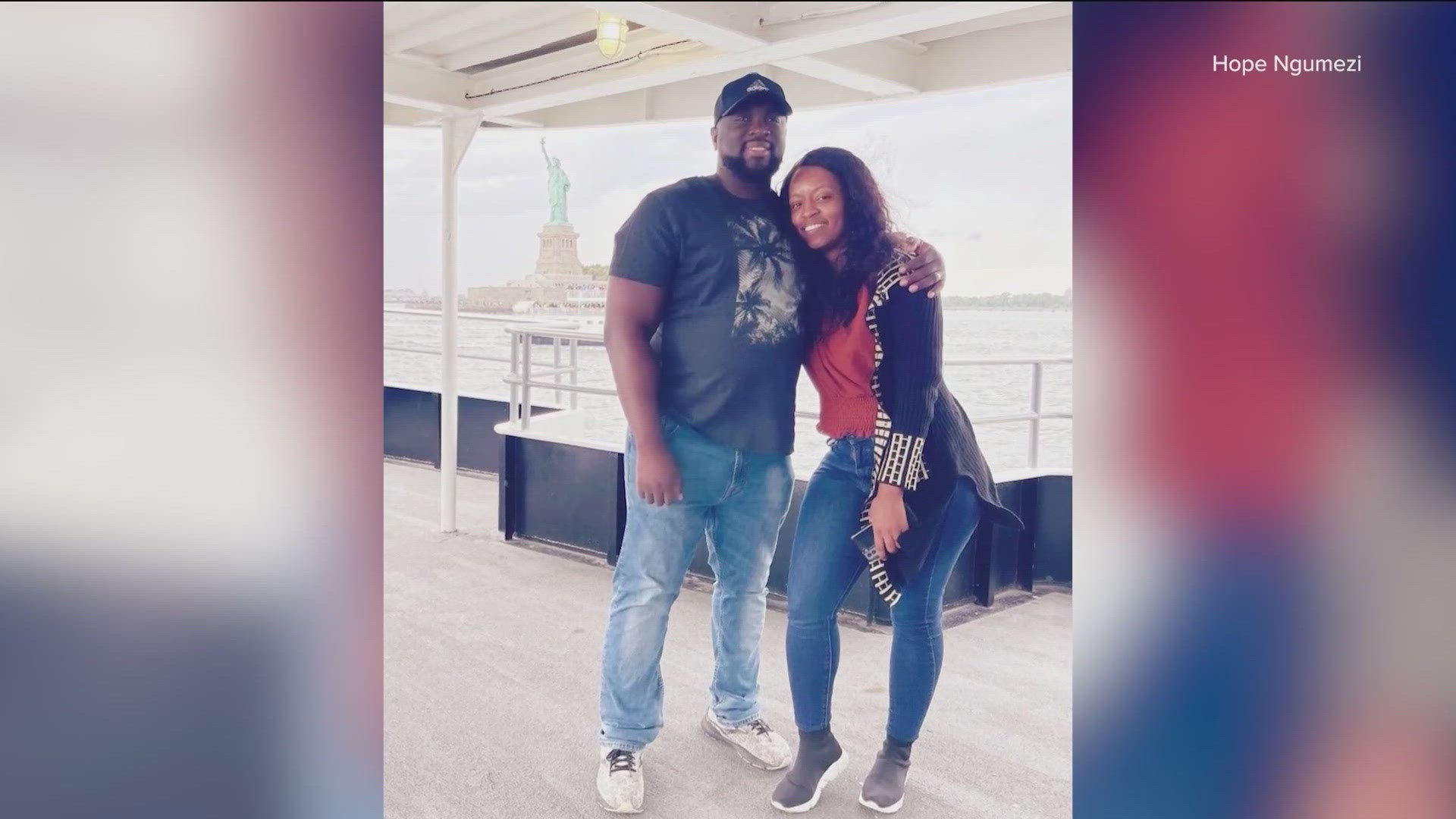SUGAR LAND, Texas — For the third time in less than a month, ProPublica has published a report on the death of a Texas woman as a result of the state's abortion ban.
On Oct. 30, the publication shared the story of Josseli Barnica, who died after a hospital told her it would be a crime to intervene in her miscarriage. One day later, ProPublica shared the story of 18-year-old Neveah Crain, who died after she tried to get care in three visits to emergency rooms.
Now, the publication is telling the story of a 35-year-old mother of two Porsha Ngumezi, who died after suffering a miscarriage at 11 weeks.
"I married my beautiful queen, but she was also going to be the mother of my kids. You know, that brought me a lot of joy," Porsha Ngumezi's husband, Hope Ngumezi, told KVUE.
Over the course of six hours on June 11, 2023, ProPublica reports that Porsha Ngumezi had bled so much in the emergency department at Houston Methodist Sugar Land that she needed two transfusions. Nurses notes show she was "passing large clots the size of grapefruit."
Hope Ngumezi called his mother, a former physician, who said his wife needed a D&C, or dilation and curettage, a common procedure for first-trimester miscarriages and abortions.
"If a doctor could remove the remaining tissue from her uterus, the bleeding would end," the ProPublica report states.
But when the obstetrician on duty finally arrived, Hope Ngumezi recalled that he told them it was the hospital's "routine" to give women a drug called misoprostol to help the body pass the tissue. Records show Porsha Ngumezi took the pills, and the bleeding continued.
"The mindset I had that day was, 'They're the experts, right?' I know they have seen miscarriages many a time, so they are well equipped to know what to do," Hope Ngumezi told KVUE.
Three hours later, his wife died.
"It could have been prevented. Felt like everyone turned their backs on us at that during that day," Hope Ngumezi said.
Dozens of doctors who reviewed a summary of Porsha Ngumezi's case for ProPublica say her death was preventable, with some saying it raises serious questions about how abortion bans are "pressuring doctors to diverge from the standard of care and reach for less-effective options that could expose their patients to more risks."
Medical experts told ProPublica it was clear Porsha Ngumezi needed an emergency D&C because she was hemorrhaging and the doctors knew she had a blood-clotting disorder, putting her at greater danger of excessive and prolonged bleeding.
ProPublica reports that D&Cs are a staple of maternal health care and can be lifesaving, but because the procedure is also used to end pregnancies, it has become tangled up in legislation that restricts abortions.
"Texas doctors told ProPublica the law has changed the way their colleagues see the procedure; some no longer consider it a first-line treatment, fearing legal repercussions or dissuaded by the extra legwork required to document the miscarriage and get hospital approval to carry out a D&C," the report states.
"This has occurred, ProPublica found, even in cases like Porsha’s where there isn’t a fetal heartbeat or the circumstances should fall under an exception in the law," the report continues. "Some doctors are transferring those patients to other hospitals, which delays their care, or they’re defaulting to treatments that aren’t the medical standard."
Lizzie Presser is a reporter with ProPublica who has heard women with similar stories to Porsha Ngumezi's.
"Some of those women got lucky – they survived. But as you see in the piece, it's a gamble. You don't know who's going to survive and who's not," Presser said.
KVUE also reached out to Texas Alliance for Life regarding ProPublica's report. The group sent us this statement:
"Porsha's heartbreaking and tragic death was preventable and not a result of Texas abortion laws. Texas law specifically exempts the 'removal of a dead unborn child, whose death was caused by spontaneous abortion' (also known as a miscarriage) from the definition of abortion in the statute. Therefore, nothing in Texas law prevented Porsha's doctors from performing a D&C (dilation and curettage).
"This latest article from ProPublica yet again misrepresents the facts, attempting to spread fear and confusion where the law is quite clear. Texas laws are designed to save the lives of women and babies. As evidenced by the latest Induced Termination of Pregnancy Report released monthly by Texas Health and Human Services, they are doing just that. Elective abortions have dropped to zero, while doctors have performed 119 medically necessary abortions during the first 24 months after the United States Supreme Court overturned Roe v. Wade in the Dobbs decision. While not reported, we know they have also successfully treated countless women facing a loss through miscarriage. Our hearts go out to Porsha's family. Our laws allow better, and Porsha deserved better. Why she did not receive a D & C is a question only the treating physicians can answer."
Hope Ngumezi told KVUE he has anger over Texas' laws, but it does not overpower the loss that he and his children now have to deal with.
"Kids were young at that time. They were 3 and 5," Hope Ngumezi said. "They just barely started life. And now they go to go through life without their mom."
To learn more about Ngumezi's story, read ProPublica's full report.

